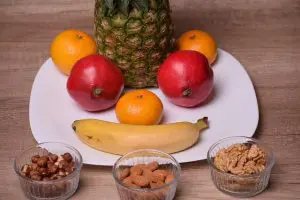“Invest in Yourself – Buy Nutrition” was the theme for the first National Nutrition Month. It was created in 1973 by the American Dietetic Association (ADA). The ADA is known now as the Academy of Nutrition and Dietetics. It actually started as a week long to begin with, but has expanded to a full month to reach more people.
This month of awareness is meant to help everyone focus on the many benefits of living a healthy lifestyle, of which nutrition plays a key part.
There are a lot of ways to celebrate National Nutrition Month both at home and at school. Looking for the best way to help the information be effective and stick? Make it fun!
Here are a few ideas to help you get started.:
Create a theme for each week which focuses on a particular aspect of a healthy lifestyle.
For example:
Week One – MyPlate – what it is and how it can help you eat healthy food
Week Two – Why choose whole grains?
Week Three – How to read nutrition labels
Week Four – Get moving every day!
Supermarket scavenger hunt
Take a class field trip to the local supermarket (or parents, take your kids shopping with you) and make a game out of finding healthy food choices.
Using an “I spy” type of game, give the kids clues about the food you’re talking about.
For example, you could say, “I spy something orange, it grows in the ground and is a bunny’s favorite food”.
Or, “I see something that’s bright red, grows on a tree and is delicious in a pie.”
Another way to have fun learning about nutrition? Have the older kids come up with their own clues that they can then share with the younger ones!
Make your own plate
 Using MyPlate as a reference, give each child three paper plates. Cut out images of food from magazines, or use some grocery ads. Ask them to put together three healthy meals (e.g. breakfast, lunch and dinner).
Using MyPlate as a reference, give each child three paper plates. Cut out images of food from magazines, or use some grocery ads. Ask them to put together three healthy meals (e.g. breakfast, lunch and dinner).
Once they’ve completed their meals, discuss the reasons why they chose the foods they did. When applicable, ask them what would have been a better option. Discuss portion size too!
Combine efforts where possible. Get the entire school or family involved in supporting your efforts. One way is to coordinate what you teach in the classroom – or at home – with the school nutrition staff.
In the cafeteria, focus on a healthy food choice each day. Hang up posters showing a particular food item. Include the nutritional benefits, and show suggestions on how to serve the food.
At home, use a new food each week – or several times per week – in your family meals to expand your child’s palate. This helps open up discussions about why some foods are healthier choices than others.
Note: The school’s website, social media, newsletters and morning announcements provide wonderful opportunities to share information and reminders about what makes a healthy food choice.
Volunteers
Think about people in your network who can add to the conversation about nutrition. Know a local chef? Ask them to come in and discuss how they prepare foods for their clients. A physician or a personal trainer can discuss the impact of eating foods that give you energy.
Other ideas
Partner with the local library to provide nutritional education opportunities through story time events, coloring contests and/or activity sheets for kids.
Get kids involved in a food donation campaign to your local food pantry or shelter.
Put together a lesson plan discussing the science behind baking. Discuss what ingredients are needed, why they’re needed and what happens when they’re used.
Classroom and/or school vegetable projects. Have kids choose their favorite vegetable, and plant the seed in a small container. Have them take it home with them at the end of the school year so that they can plant it somewhere at home (assuming the season is right for planting!)
As you can see there are a lot of ways you can drive home the importance of a healthy lifestyle, while making it fun and memorable.



